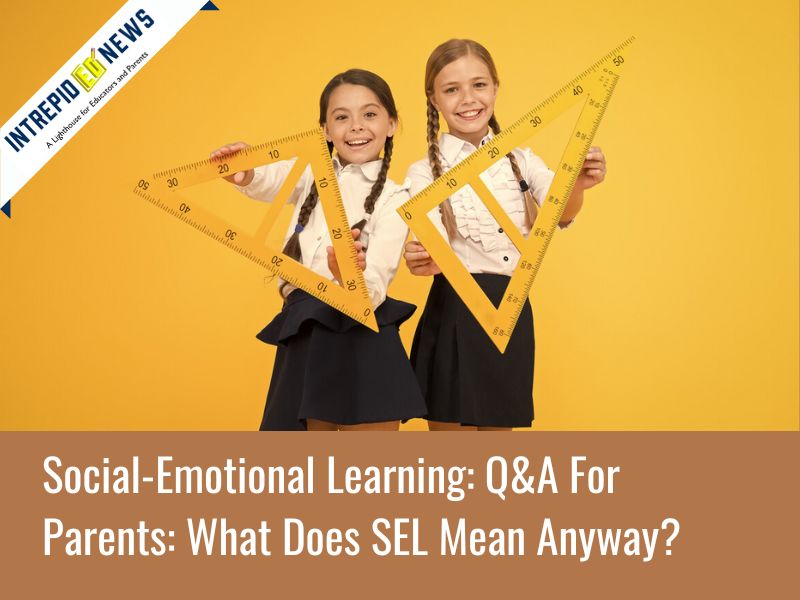This article is republished with permission from IntrepidEd News
Deborah Farmer Kris
“I don’t like dealing with all the social and emotional drama of middle school,” a first-year teacher vented to me 20 years ago. “I just want to teach science!”
“I hear you,” I told him. “But think of it this way: you aren’t teaching science, you are teaching kids. If we spend time meeting their social and emotional needs, they will be better science students. It’s really hard to focus on the periodic table when your stress response is on high alert.”
Since that time, the term SEL has become a much more ubiquitous part of schools’ language, programs, and teacher training. That said, there are a lot of educational acronyms out there, and parents can’t be expected to know them all! So here’s a quick primer on what schools mean by Social and Emotional Learning.
Good schools recognize that kids bring their whole, complex selves to the classroom. A child’s background, culture, emotional development, and relationship skills will influence how they interact with others, how they perceive themselves, and how they learn. Social and emotional learning is designed to help kids become better at recognizing, expressing, and regulating their emotions — and this, in turn, helps them build stronger relationships with others.
These skills also lay the foundation for life-long character development. It’s easier to be brave if we have had practice working through our fears. It’s easier to be compassionate when we have learned how to imagine how others might be feeling. And it’s easier to be responsible when we understand our unique role in helping our classrooms, families and communities thrive.
S: What are Social Skills?
Kids start developing social skills in infancy. Babies look to caregivers for social cues as they learn how to interact with the world. In their preschool years, kids develop a theory of mind — learning that the people they meet have needs and likes and dislikes that are distinct from their own. As they grow older, children and teens develop more sophisticated social skills including perspective-taking, empathy, friendship skills, listening skills, social problem-solving strategies, and civic engagement.
E: What Are Emotional Skills?
My favorite distillation of the key emotional skills comes from Marc Brackett, Director of the Yale Center for Emotional Intelligence and creator of the RULER approach. Here is how he describes them in his book “Permission to Feel’”:
- R: RECOGNIZE our own emotions and those of others, not just in the things we think, feel, and say but in facial expressions, body language, vocal tones, and other nonverbal signals.
- U: UNDERSTAND those feelings and determine their source — what experiences actually caused them — and then see how they’ve influenced our behaviors.
- L: LABEL emotions with a nuanced vocabulary.
- E: EXPRESS our feelings in accordance with cultural norms and social contexts in a way that tries to inform and invites empathy from the listener.
- R: REGULATE emotions, rather than letting them regulate us, by finding practical strategies for dealing with what we and others feel.
L: How Do Students Learn These Skills in School?
Schools approach SEL in a variety of ways, including class meetings, advisory programs, wellness programs, guest speakers, curriculum integration, and student-led initiatives. But the most important resource is teachers and administrators — amazing professionals who develop safe and supportive classrooms, keep their eyes on the child, and intervene proactively to support children when they struggle.
Remember, just because a school has an SEL program doesn’t mean kids won’t experience the inevitable ups and downs of childhood. What it should mean, however, is that students will have caring adults by their side who are skilled at mentoring them through it.
Additional SEL Resurces for Parents
While school is a key partner in teaching SEL, kids take their first cues from parents and caregivers. Here are 10 articles about how parents can support social and emotional learning at home.
- Four Questions to Ask When Emotions Spike
- The 3L Reset: Taking 3 Minutes to Help Kids Build Stronger Habits
- “I’m Having a Human Day”: How to Help Kids Reframe and Practice Self-Compassion
- Emotionally-Literate Parenting: The Power of Helping Kids Name Their Fears
- Breathing Exercises to Help Calm Young Children
- When a Child’s Emotions Spike, How Can a Parent Find Their Best Self?
- How to Help Teenage Girls Reframe Anxiety and Strengthen Resilience
- How Strengthening Relationship with Boys Can Help Them Learn
- How Mindfulness Can Help Kids (And Parents) Weather Emotional Storms
- How Play Helps Kids Navigate Difficult Times
